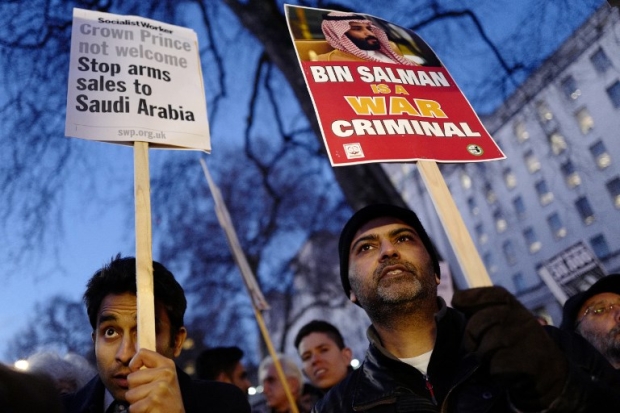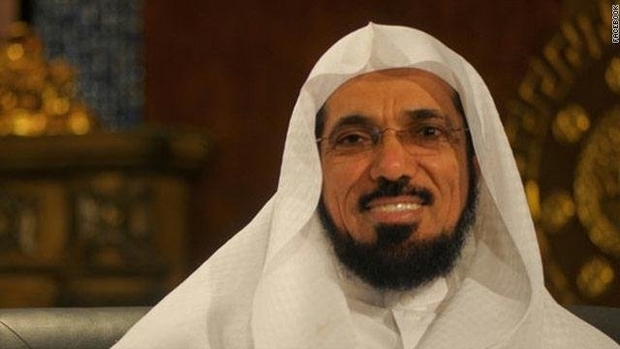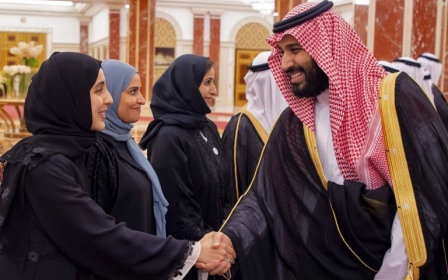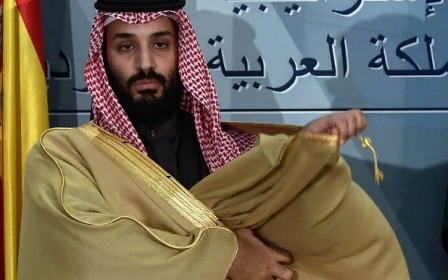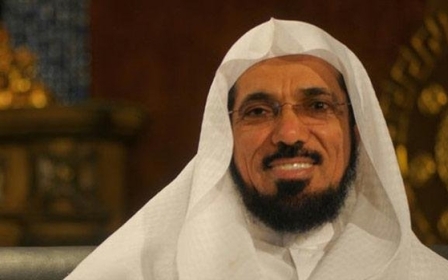Exclusive: Saudi king's brother is considering self exile

Prince Ahmed bin Abdulaziz, the brother of King Salman of Saudi Arabia, is considering not returning home after comments he made to Yemeni and Bahraini protesters outside his London home earlier in the week in which he distanced himself and the rest of the Al Saud family from the actions of his brother and his nephew, the Crown Prince Mohammed bin Salman (MBS), a senior source close to the prince told Middle East Eye.
Challenged by protesters chanting "Down, down Al Saud. Criminal Family," the prince turned to them and asked: “Why are you saying this about Al Saud?“ Ahmed began. “What does the whole of the Al Saud family have to do with this? There are certain individuals who are responsible. Don’t involve anyone else.”
Asked by the protesters who was responsible, the prince replied: “The king and the crown prince, and others in the state.”
Within hours of the video going viral on social media, the official Saudi Press Agency issued a report allegedly quoting Prince Ahmed. The SPA reported the prince as saying that the "interpretation" that he had criticised the king was "inaccurate". SPA said Prince Ahmed was merely saying the royal family was responsible because of their positions in the government
Stay informed with MEE's newsletters
Sign up to get the latest alerts, insights and analysis, starting with Turkey Unpacked
The source close to the prince told MEE that he stood by his original remarks. He said the report by state controlled SPA was fake and that the words quoted by the agency were not his, according to the source.
After the video surfaced, a hashtag in Arabic went viral. It read: “We pledge allegiance to Ahmed Abdulaziz as king.”
Breaking the silence
This is the first time a member of the Al Saud family of the prince's rank and seniority has broken the family code of silence. The prince has publicly and deliberately distanced the family from the reign of King Salman. If the prince confirms his decision not to return, his act would be the biggest public challenge yet to Salman's rule.
Prince Ahmed's remarks to the Yemeni protesters about the position of the royal family clearly allude to the days when big decisions, such as the decision to launch air strikes on Yemen, were made collectively in consultation with other leading members of the family. Under King Salman and his son Mohammed, the crown prince, this is no longer the case.
Ahmed’s unhappiness with the power that his young nephew MBS now wields is well known. He was one of three members of the Allegiance Council to oppose bin Salman’s appointment and Ahmed pointedly did not give his allegiance to his nephew when he was made crown prince.
Ahmed failed to attend official receptions given by his brother King Salman. When their brother Abdelrahman bin Abdulaziz died, only two pictures were hung at the reception given by Ahmed: that of King Abdulaziz, the founder of the kingdom, and the current king. The crown prince’s portrait was notably missing, so much so, that when a mobile video of the occasion went viral, government bloggers went into overdrive on social media to claim the footage was faked.
The rift between brothers was such that when Ahmed sent Eid greetings to King Salman in June, observers wrote that this gesture “signalled a change of his opposition” to the crown prince.
Still, the prince has so far avoided the fate of the nephews who were arrested and detained in the Ritz Carlton, and some of whom were tortured and maltreated. Being the brother of King Salman has afforded him some measure of personal protection and so far given him the freedom to travel outside the kingdom to the US and UK. After his comments in London this week, this may have changed.
Apart from expressing the dismay of the royal family, Ahmed also had personal reasons for his disenchantment. The youngest of the Sudairi brothers, he was passed over on two occasions for the post of crown prince, a position which customarily should have been his.
The first time was when the late King Abdullah installed his own brother Muqrin as deputy crown prince. Salman’s arrival did not correct this. Indeed he bypassed his younger brother again by appointing Mohammed bin Nayef as crown prince and his son Mohammed as deputy crown prince.
In July, a distant relative of Ahmed’s in Dusseldorf, the dissident prince Khaled bin Farhan, called on his uncles, Prince Ahmed and Prince Muqrin, to depose Salman, whose rule he called “irrational, erratic and stupid”.
If there was some form of restitution, the Al Saud family would naturally look to Prince Ahmed, a former interior minister, to lead it.
Death sentences
This is the second event to shake the kingdom. The first was three consecutive calls by the public prosecutor for death sentences in one week.
These were not for acts of violence. The detainees are not jihadis. They are three influential and moderate Sunni preachers - Salman Odah, Ali al-Omari, and Awad al-Qarni. Odah’s “crime” was to call in a tweet for reconciliation between Saudi Arabia and Qatar.
All have been in prison for some time, but no one expected the so-called liberal clique around MBS to go as far as to threaten to behead them. Odah’s son, Abdullah, told Middle East Eye that his father was only informed of the charges during Tuesday’s trial, which was held secretly at the Specialised Criminal Court in Riyadh.
Odah’s crime was holding independent views and refusing to become the mouthpiece of the government, Abdullah said.
They are all Muslim scholars who belong to the International Union of Muslim Scholars headed by Sheikh Yousef Qaradawi, who now lives in Doha.
The union was banned at the time of Abdullah, but when Salman took over, Qaradawi himself was invited to the kingdom to take Umrah, the lesser of two pilgrimages to Mecca.
Since then, the Union of Scholars has been declared a terrorist organisation and its leading scholars now face capital punishment.
Before his arrest, Omari was a popular broadcaster. His TV station “For Youth” had a huge audience, and Omari’s face was plastered on billboards on the road from Jeddah to Mecca.
Nor are death sentences limited to Sunni preachers. The week prior, a prosecutor in the same court sought the death penalty for Israa al-Ghomgham, her husband Moussa al-Hashem, and four others involved in anti-government protests in Qatif. Israa would be the first female human rights activist to be beheaded if the sentence is carried out.
Taken together, Prince Ahmed’s comments and these death sentences reveal that powerful tremors are destablising the kingdom.
If these death sentences are carried out, the so-called “liberal current” around the crown prince will be declaring war on a substantial swath of religious society.
It would be faced with the choice of submitting to secularism at the point of a gun, or swelling the ranks of the real religious extremists that undoubtedly exist in secret cells around the kingdom.
All three preachers are considered dangerous progressives by the Wahhabi establishment, which continues to enjoy official protection. The three have preached about democracy and the importance of morality for youth. One pushed to decriminalise homosexuality.
At the same time, King Salman is at war with the House of Saud. Religious conservatism and the House of Saud are the twin pillars of the Saudi state. To attack both at the same time is to kick away the props of your legitimacy as king.
This article is available in French on Middle East Eye French edition.
Middle East Eye delivers independent and unrivalled coverage and analysis of the Middle East, North Africa and beyond. To learn more about republishing this content and the associated fees, please fill out this form. More about MEE can be found here.


